Legislators host town hall at Ames City Hall
Letter writer Antonio Ball believes the climate on Iowa State mirrors that of the United States in regard to political discourse.
March 30, 2019
The Center for Rural Affairs, NAMI Central Iowa and the League of Women Voters of Ames and Story County hosted a town hall style forum with Iowa legislators Saturday at the Ames City Hall.
The forum included discussion of the recent decision of UnitedHealthcare to pull out of Iowa’s private management medicaid program, hemp production and the proposed changes to the state judicial nominating process.
Rep. Beth Wessel-Kroeschell, Rep. Lisa Heddens and Sen. Herman Quirmbach, all Democrats representing the Story county area, made up the panel.
Cynthia Paschen, who moderated the forum, said other area representatives had been invited but could not attend due to commitments in their districts.
The forum began with panelists discussing what they have done in the legislature during this current session and what they hope to do before the scheduled end of the session in May.
“Having this disruption is going to be incredibly hard on a very vulnerable population,” Heddens said in her opening remarks of the UnitedHealthcare pull out.
UnitedHealthcare currently serves more than 400,000 Iowans.
Heddens said she wants to work with the governor and Republican colleagues to find a fix to the healthcare problem and said she would be willing to have the legislature go beyond its scheduled sitting to ensure people have adequate services and are secure with their healthcare.
The Iowa Senate worked on another version of the “ag-gag” law, Quirmbach said.
The bill was passed by the House and signed by Gov. Reynolds. A similar law was ruled unconstitutional by a federal judge in January for violating the first amendment.
Ag-gag laws apply penalties to whistleblowers who investigate activity on farms such as unsafe or abusive practices.
“One good thing that did happen in the legislature this week is we did pass an extended medical cannabis bill,” Wessel-Kroeschell said.
The bill would allow for providers to prescribe a higher dosage to patients who are terminally ill.
Hemp production was mentioned by Roger Engstrom, an Ames resident.
“There’s some controversy over hemp and marijuana, and they’re not the same at all,” Engstrom said.
Legislation has been introduced in both houses of the Iowa legislature that would legalize and regulate the hemp industry.
“It is a legitimate agricultural product that would help to diversify our agricultural economy,” Quirmbach said. “The issue there, with regard to marijuana apparently hemp does contain a certain small amount of THC, or some varieties do, and that’s the active ingredient in marijuana.”
Wessel-Kroeschell said she has some constituents who are very upset about enforcement in Story County of hemp CBD oil, and said she would look into adding an amendment to the hemp bill to bring state law in line with federal.
The Story County attorney, Jessica Reynolds, issued an announcement Monday to make sure that residents are aware that CBD oil is unlawful by Iowa Code and should not be sold.
“Federal law allows the use of hemp CBD oil, and state law does not,” Wessel-Kroeschell said. “The Story county attorney issued the order … because they are in compliance with federal law but not state law.”
Iowa law currently allows for patients with certain conditions certified by a physician to purchase CBD oil at one of five state-licensed dispensaries.
“I’d like to ask about the judicial nominating process that has been proposed,” Jan Beran of Ames said. “I encourage you to vote against it and could you speak to your perspective as to whether our exemplary judicial nominating process may be dispensed with?”
The proposed legislation would have the governor appoint members to the state judicial commission that nominates members to the Iowa Supreme Court and Court of Appeals, with the majority and minority leaders of both houses of the state legislature appointing two members each.
“I think Iowa has one of the best judicial nominating processes and certainly do not want to see it politicized with any type of change to it,” Heddens said.
Judges are currently chosen based on merit by a commission composed of 17 members, two from each congressional district elected by lawyers, two from each congressional district appointed by the governor and the last member, its chairperson, being the senior associate justice of Iowa Supreme Court.
“There should be an independent third branch of government,” Wessel-Kroeschell said. “We just can’t be making political decisions for our courts.”
Editor’s Note: A previous version of this story did not list NAMI Central Iowa as an event sponsor, and another version incorrectly recognized NAMI Central Iowa as the Central Iowa affiliate of NAMI. The article has been updated to reflect the full list of sponsors and NAMI Central Iowa’s actual name. The Daily regrets these errors.

















